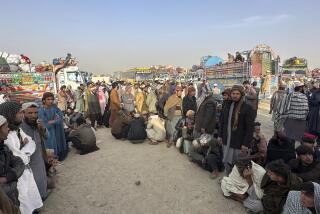Pakistan releases a top Afghan Taliban leader
- Share via
ISLAMABAD, Pakistan — Pakistan on Saturday released a top Afghan Taliban official who Afghan officials believe could nudge Islamist militants to the bargaining table and help hammer out a political solution after more than a decade of war.
Afghanistan had repeatedly called for the release of former Afghan Taliban second-in-command Mullah Abdul Ghani Baradar, reportedly captured in a joint Pakistani-CIA raid in Karachi in 2010.
“We believe that his release will help the Afghan peace process,” said Aimal Faizi, spokesman for Afghan President Hamid Karzai.
Pakistani Foreign Ministry spokesman Aizaz Ahmad Chaudhry said the release signified an effort by Pakistan to facilitate the Afghan reconciliation process. At the time of Baradar’s capture, Afghan officials had accused Pakistan of trying to sabotage peace efforts and weaken Afghanistan to bolster its own influence, an allegation Islamabad denied.
But some analysts question whether this will provide the breakthrough Afghanistan is seeking as foreign combat troops prepare to withdraw from the country by the end of 2014.
“I don’t think this will have any magnificent outcome,” said Atiqullah Baryalai, a Kabul-based political analyst and former Afghan deputy defense minister. “If he had such great effectiveness, why didn’t the Taliban’s power ever really suffer following his arrest?”
Underscoring the stakes, three NATO troops were killed Saturday in Afghanistan’s eastern province of Paktia when a man in an Afghan army uniform opened fire, according to alliance and Afghan defense officials. In keeping with North Atlantic Treaty Organization policy, the nationality of the troops and attack details were not immediately released.
Some analysts said Islamabad’s move could provide a double-win.
“Pakistan’s objective is to send a goodwill gesture to Kabul,” said Hasan Askari Rizvi, a defense analyst and professor at Punjab University. “Pakistan also wants to send a goodwill gesture to the Afghan Taliban with the release of one of its top leaders. Pakistan will gain either way.”
Baradar, born in the southern Afghan province of Oruzgan in 1968, according to Interpol, fought the Soviet Union in the 1980s and helped found the Taliban in 1994. He rose to become the group’s deputy defense minister.
He was once close to Mullah Mohammed Omar, the reclusive head of the Taliban, who reportedly gave him his fighting name, Baradar, or brother. After Omar’s Taliban government fell in 2001 following the U.S.-led invasion of Afghanistan, Baradar reportedly served as deputy head of the insurgency. He is said to be a pragmatist possibly willing to play the role of mediator.
But some analysts believe his years in prison may have eroded his contacts and usefulness, given how quickly alliances shift within the insurgency and his weak links with newly recruited foot soldiers.
His health may also affect any future role. According to officials who requested anonymity because they were unauthorized to speak publicly, Baradar suffers from diabetes and high blood pressure and was hospitalized while in detention in Karachi.
Baradar is the most senior Taliban member detained since 2001. His release brings to nearly three dozen the number of Taliban prisoners freed by Islamabad since last year. Afghan officials hope the amnesty efforts will encourage peace talks. But critics, including many in the United States, say that it only frees more militants to further destabilize the region and that there’s little evidence that releases have prompted political progress.
Karzai, who is from the same tribe as Baradar, has petitioned Pakistan to help open direct communication between his government and the Taliban, which has repeatedly dismissed his administration as a puppet of the United States. Analysts say the Taliban is in no rush to reach a political settlement because it believes its political clout and military might will only increase with the departure of foreign combat troops.
Pakistan is an important player in any Taliban peace initiative. Taliban strongholds bridge the porous Afghan-Pakistani border. Pakistan helped the Taliban gain control of Afghanistan in the mid-1990s, and Pakistani elements are accused of continuing to fund, protect and exert control over the Taliban, charges Islamabad strongly denies.
Analysts said Islamabad was increasingly concerned that a resurgent Taliban in Afghanistan could embolden the Islamist insurgency in its own country.
Pakistan is playing a double game, some analysts said. It has decided it doesn’t want to be seen as opposing any Afghan peace agreement. “But that doesn’t mean that they want to solve Afghanistan’s problem anytime soon either,” Baryalai said.
The Karzai government wants Baradar returned to Afghanistan, something Pakistan has balked at.
“He may stay in Pakistan for some time but ultimately will go to Afghanistan because that’s where the Taliban are,” defense analyst Rizvi said. “If Pakistan tried to keep him here, that would mean he’s still in detention.”
In June, an effort to start a dialogue in Doha, the capital of Qatar, among the U.S., Afghanistan and the Taliban fell apart when the Afghan government objected to the offices and sign used by the militant group.
Special correspondent Khan reported from Islamabad and Times staff writer Magnier from New Delhi. Special correspondents Hashmat Baktash in Kabul, Afghanistan, and Zulfiqar Ali in Peshawar, Pakistan, contributed to this report.
More to Read
Sign up for Essential California
The most important California stories and recommendations in your inbox every morning.
You may occasionally receive promotional content from the Los Angeles Times.










